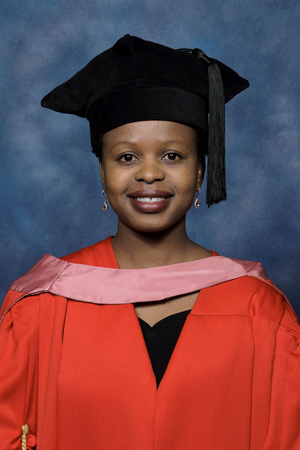There is a general way of thinking among most hopeful undergraduate students that should the traditional way of paying for tertiary education not be available to them, they are left without the possibility of perusing an exciting career.
An inspiring young academic from the North-West University’s (NWU’s) Faculty of Health Sciences destroyed this myth by kicking the doors of advancement wide open.
Dr Lebo Gafane-Matemane, a senior lecturer in the research unit for Hypertension in Africa, says her biggest goal is to bring positive change to the health of South Africans through her cardiovascular research.
The National Research Foundation (NRF) funded her for her honours degree in Physiology in 2011, for her MSc in physiology in 2013, and for a PhD in physiology in 2014. She was subsequently employed as a full-time senior lecturer at the NWU.
“The NRF made it possible for me to study until I could get a job and afford my own fees. The funding instilled in me a commitment to excellence and to my dream of a career in research,” she says.
“I had to work very hard to make progress and produce outputs in order to secure funding for the following year, and this became the foundation on which my entire career is built. My honours was obtained with distinction and my MSc was completed in one year with a distinction as well. My PhD was achieved in three years with excellent examiner reports.”
Dr Gafane-Matemane’s PhD work received a platinum award for best oral presentation at the joint Stroke and Hypertension Congress in 2016, as well as a travel grant to attend and present at the International Society of Hypertension Meeting 2016 in Seoul, South Korea.
The scientific contribution of her PhD work was featured on “Spotlight of the Month” in November 2017 as determined by the New Investigator Committee of the International Society of Hypertension.
Funding opened doors
Just how has her relationship with the NRF influenced her career and personal life?
“First of all, without NRF funding, I would have not reached the current stage in my career and personal life. In my final BSc year, I did not even dream of obtaining a master’s degree, let alone a PhD, mainly for financial reasons. This is because my entire undergraduate degree was funded by NSFAS and, at that time, the scheme did not cater for postgraduate students.
“Despite the uncertainty regarding funding, I went ahead to apply for an honours in physiology because of my passion for the functioning of the human body. I was accepted and in early 2011 was informed that I received a scholarship from the NRF for my honours degree. That opened a world of possibilities for me. I then started to think of doing a master’s in physiology,” she says.
In 2013, Dr Gafane-Matemane received the Innovation Master’s Scholarship to study at the NWU and she was able to complete her degree in just one year. She says her biggest gratitude is the fact that the amount of funding was enough to pay for her studies and for personal use such as travelling from North-West to see her son in Limpopo.
“With my PhD funding in 2014, I was able to afford accommodation off-campus to stay with him full-time. So, with NRF funding, I was able to successfully complete my studies and still be a present mother, which is not always easy for women from disadvantaged backgrounds pursuing postgraduate studies.”
Asked about her research, it is clear that she is very determined to impact the lives of South Africans.
“South Africa has a high prevalence of hypertension. It is no longer regarded as a health problem of only the elderly, as it is becoming common in younger individuals as well. STATS SA reported that hypertensive diseases, heart disease and cerebrovascular diseases are among the leading causes of death in South Africans, emphasising the urgent need for research to curb the rising cardiovascular disease burden.
“I am currently involved in numerous research projects focusing on factors linked to hypertension and cardiovascular disease in children, young adults, the elderly and individuals living with HIV/Aids.”
Through her research she mainly aims to build on existing knowledge to aid in the understanding of the pathophysiological pathways that contribute to cardiovascular disease development and progression to death.
“The results of this research will, therefore, have a wide-ranging impact and stimulate interventional research with the potential to alleviate hypertension, thereby reducing the risk for endpoints such as stroke and heart disease,” she concludes.

Dr Gafane-Matemane.
